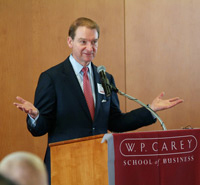Marianne Jennings, a professor of legal and ethical studies in business at W. P. Carey School of Business, recently noted that major business scandals used to be spaced about 10 years apart. Unfortunately, the cycle now appears to be compressing. In a recent talk before W. P. Carey MBA Executive students, Bradley Preber, the partner-in-charge of Grant Thornton’s Forensic Accounting and Investigative Services practice, said that any company that continues having pervasive and systematic behavior problems with its employees must look at its culture to see if it could be partly what drives that unethical behavior.





